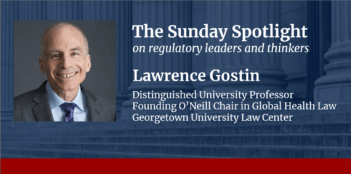
The Regulatory Review’s extensive COVID-19 global series exemplifies Penn Law’s international and cross-disciplinary strengths.
In a recent podcast produced by the University of Pennsylvania Law School, Larissa Morgan, the Editor-in-Chief of The Regulatory Review, and Cary Coglianese, the Edward B. Shils Professor of Law and faculty advisor to The Review, discussed the series of essays that The Review published on how countries from around the world have adapted their administrative and regulatory laws to respond to the global coronavirus pandemic.
What follows is an edited transcript of the podcast that was moderated by Matt Merin of the Penn Law communications office.
Merin: As everyone can see, right now we are in the middle of a pandemic, and The Regulatory Review has had an ongoing series covering certain issues in regard to regulation and the pandemic—and, as I understand it, comparing different countries as well.
Coglianese: Over the last couple of months, many of the pieces that The Review’s staff writers have been preparing, and so many of the pieces that have been coming in from outside contributors—leading scholars and practitioners—have focused on the COVID-19 crisis. As much as this is a public health crisis of the highest order, it is also a challenge for law and regulation. Out of about 40 essays total that have been published to date on the COVID-19 crisis, about half of these have focused on various developments in the United States, such as with the U.S. Food and Drug Administration regulations, the regulation of privacy, and COVID-19’s effect on education. In addition to these topical domestic regulatory issues, the students have put together, with some leadership from faculty as well, a special series on how nations around the world are responding to the COVID-19 crisis.
Morgan: Our comparative series is called “Comparing Nations’ Responses to COVID-19.” We launched the series in April, and so far it features leading scholars from more than 20 different countries who discuss the administrative law and regulatory dimensions of the global response to COVID-19. Every continent is represented. We also have essays about the World Health Organization (WHO) and the European Union. It is a robust series, and it is unique from our other standalone essays on COVID-19 policy issues.
Coglianese: Just to run down some of the countries that have been featured already: the United States, China, France, Italy, Israel, South Africa, UK, India, Canada, Germany, South Korea, and the Netherlands. We have pieces coming up on Mexico, Colombia, and Brazil. We already have some pieces on Organization for Economic Cooperation and Development countries and the European Union as well.
This has really been a remarkable compilation of the legal dimensions of the response to the COVID-19 crisis. And I have to give full credit to Neysun Mahboubi, one of our lecturers in law and a key figure in our Center for the Study of Contemporary China here on campus at Penn. Neysun really was the inspiration for the series and has been instrumental in recruiting many of the authors. I think this series is truly the only place that one could go today to learn about how such a broad range of countries’ legal systems have responded to or have been adapted in response to the COVID-19 crisis.
This is a global crisis. And The Regulatory Review has always had a global presence. Its readership spans the globe, and its coverage is global in its reach. This particular series is quite fitting for what The Regulatory Review does.
It is also quite fitting for what the University of Pennsylvania Law School is all about. The COVID-19 crisis calls for scientific expertise and public health expertise. It also holds tremendous economic ramifications. And it poses tremendous challenges to legal systems in every country around the world, creating new challenges and a need to respond quickly. The crisis has led in many countries to a reconfiguration, at least on a temporary basis, of the relationship between government and business, and state authority and individual liberty. Some worries exist that these new relationships could become permanent.
This series in The Regulatory Review is the kind of project that fits very well with the University of Pennsylvania Law School’s cross-disciplinary approach to law, where we can see how law is responding to and dealing with the scientific, medical, and public health crises—and an economic crisis—through the restructuring of the regulatory systems.
Morgan: Readers are receiving knowledge about how law is at the center of all of the problems that Professor Coglianese mentioned. Whether it is working through public health-related issues in a country, or the economic suffering from this pandemic, this series is so unique, and we are grateful to Neysun Mahboubi for helping us put it together, and to the Executive Editors of The Regulatory Review, Meghan Downey and Lucas Siegmund, who have been leading this effort and have been in regular contact with the contributors featured in the series. This series has been a team effort, and I hope readers will get a lot out of its content.
As you read these essays, you see how some countries have relaxed certain rules, such as testing protocols and rules that apply to government responses, while other countries—and even the same countries—have placed heightened impositions and additional requirements on their citizens, such as quarantining and social distancing. This crisis is a test of legal systems around the world, as much as it is a global pandemic.
Coglianese: I would also echo what Larissa said about the series being a team effort. This is one of the largest, most ambitious series of all The Regulatory Review’s series. Our hats go off to Meghan and Lucas for their great job in spearheading most of the editorial work. Not all of the contributors have English as their primary language, but the editors run everything in this series, and everything else The Review publishes, through a multi-level editing and fact-checking process. It is a very careful, rigorous production process. The Review is a selective publication. This particular series is really drawing on some of the leading experts on administrative law and regulation in each of the countries.
Strikingly, we see a lot of commonalities across these different countries—the use of emergency law provisions, the adaptation of existing legal frameworks, and, in some cases, the extensive use of obligation alleviation, as I put it in my essay in the series.
Obligation alleviation is the relaxation of laws or rules. In the United States, for example, there have been emergency use authorizations for new testing protocols or treatment techniques for COVID-19 disease. That said, we also see a lot of obligation imposition going on as well in the United States, and also around the world, with quarantining and stay-at-home orders, with business closures, bans on public gatherings, and the like.
And there always exists the possibility for obligation imposition or obligation alleviation to be abused. One of the vital roles that administrative law plays is to make sure that there is proper oversight when governments are both imposing or relaxing rules, and that they do so in the public interest overall.
Merin: Are there any particular essays or reports you recommend as a beginning place? A natural jumping off point? Or is that just at the beginning?
Coglianese: We have a wonderful piece by a former visiting fellow from China, Shen Kui, who is one of the leading administrative law scholars and who has written about some of the early responses that occurred in China following the outbreak there. One of the early countries to be hit hard was Italy. We have a piece by Maria De Benedetto, who is an administrative law scholar at Roma Tre University. She writes in her essay about how this crisis calls for trust—that people are going to have to trust that the government is acting wisely. And then, she asks, how do we create an administrative law apparatus and an oversight process to make sure that the public can maintain its trust in government?
Morgan: I think it depends on what the reader is interested in. For example, if a reader wants to learn about a particular country’s response to COVID-19, we have opportunities for a reader to do that. As Professor Coglianese had said, we have coverage of China, France, Italy, Australia, and various other countries. But I would recommend starting with some of the larger more global pieces. The piece about the World Health Organization is a great one. It is called “Increasing the Legitimacy of the World Health Organization” by Oswald Jansen. He talks about how international organizations need clear administrative principles to guide their public health emergency responses. That essay is good overall coverage of what is happening in terms of larger, international organizations.
Professor Coglianese’s essay, which is the first essay listed in our series, is also a great starting point because it provides some of the theoretical underpinnings of the regulatory responses to this crisis.
Coglianese: Thank you, Larissa. I should note that we are recording this podcast on a day when President Trump has issued some kind of ultimatum to stop funding the WHO. These international organizations are easy scapegoats. Of course, as any organization or institution, they have opportunities for improvement. But I mention President Trump’s attack on the WHO just to give you an idea of how timely these essays can be. They give readers a vital background into controversies and conflicts around international institutions, and around the tensions between keeping businesses shut down or reopening them.
And the series also includes some really forward-thinking essays. I am reminded of one by Cristie Ford, a Canadian corporate law scholar at the University of British Columbia, who writes a very interesting and thoughtful piece about how, in Canada, and probably also anywhere around the world, the COVID-19 crisis is leading us to rethink what a judicial system means. Our traditional notion is that people physically walk into a courtroom, and they make physical presentations to a judge. It turns out that for many disputes, even in normal times, this in-person structure is problematic. It is difficult for people to get down to the courtroom, for example. So one of the things that the Province of British Columbia has been doing in one of its courts is allowing for remote proceedings. And that is increasingly what we are seeing needs to be considered in the context of this pandemic, especially when many of our judges are themselves at higher risk of complications from COVID-19 because of their age. Not surprisingly, we also see that the U.S. Supreme Court has been conducting oral argument by telephone.
These are disruptive times. They are disruptive to our ordinary ways of carrying out vital government functions in the judicial system, the educational system, and the employment system. Consider what it takes to make sure that people who are unemployed get covered by unemployment insurance. There is a wonderful student-written piece by Allie Gottlieb about the challenges that the state of Florida has gone through in trying to make sure that unemployed workers get their employment insurance benefits. The websites for these state unemployment agencies have not been able to handle the capacity for the tens of millions of workers who have been laid off due to the pandemic.
The reach of this crisis is broad, and the coverage within this particular series, and in The Regulatory Review overall, is also quite broad and illuminating.
Merin: How do you think that the pandemic influence is going to affect regulation into the future?
Coglianese: We do see this pandemic laying bare a fundamental truth about regulation and law in general: society is moving pretty quickly, even in normal times. And law and regulation tend to be much more static. One lesson to take from this experience, at least I hope we might learn from it, is that regulatory systems also need to be responsive. It is not just a matter of putting words on paper, or rules down in the law books, and thinking that the task of regulating is done.
Regulating is actually an ongoing activity. It requires ongoing vigilance. And this is true certainly in the face of a fast-moving public health crisis. But it is also true in a world of fast-moving technological innovation—of changing innovations in business forms and investment strategies. We need to have a public regulatory system that is adequately resourced and sufficiently staffed with individuals who can keep tabs on the changing world, be responsive to it, and be adjusting rules—not letting them necessarily sit on the books forever just because at one time they were thought needed. Regulating well requires engaging in an ongoing retrospective review of regulations and calibrating the regulatory responses to the real challenges that people face today. It is not easy, and it does require a commitment and resources to staff regulatory agencies to make them smarter, more nimble, and more agile.
What we have seen for many years—even preceding this current pandemic—lays bare the need for a government that is responsive, well-resourced, smart, capable, and not stuck in its ways.
Morgan: That is one lesson that I have learned from covering the COVID-19 pandemic through a health care lens. What we are seeing right now with the use of telehealth, and some of the regulations around telehealth, highlights how regulation needs to continuously change and be monitored, especially in times of a crisis like this.
For example, I wrote a piece about how the COVID-19 pandemic is impacting the opioid epidemic. I talked specifically about the U.S. Drug Enforcement Administration’s decision to ease some of its restrictions on prescribing controlled substances for individuals who are in opioid treatment programs. The decision was made to help individuals continue their treatment in this time of social distancing and quarantining. That is one example of how agencies need to be held accountable to make tough decisions. Controlled substances are highly regulated because they are dangerous. But sometimes regulations need to be updated in order to weigh a tradeoff and to help individuals during this time.
Coglianese: I think Larissa’s essay is a brilliant piece, very creative, and indicative of the kind of caliber of students we have at Penn Law—it shows the way that they think outside the box. We are facing, right now, a public health crisis of huge proportions with the pandemic. But for the last decade or so, we have been dealing with another huge public health crisis around the opioid epidemic. To bring those two together in such a fresh, informative way is emblematic of the kind of quality and distinctive coverage of regulatory issues that are provided through The Regulatory Review. And Larissa’s piece is also indicative of the kind of learning opportunities that The Review affords students, such as Larissa, who are involved in and leading the publication.
Merin: Thank you for carrying me through this conversation today.
Coglianese: It has been my pleasure.
Morgan: Great, thank you so much.
This essay is part of an ongoing series, entitled Comparing Nations’ Responses to COVID-19.





